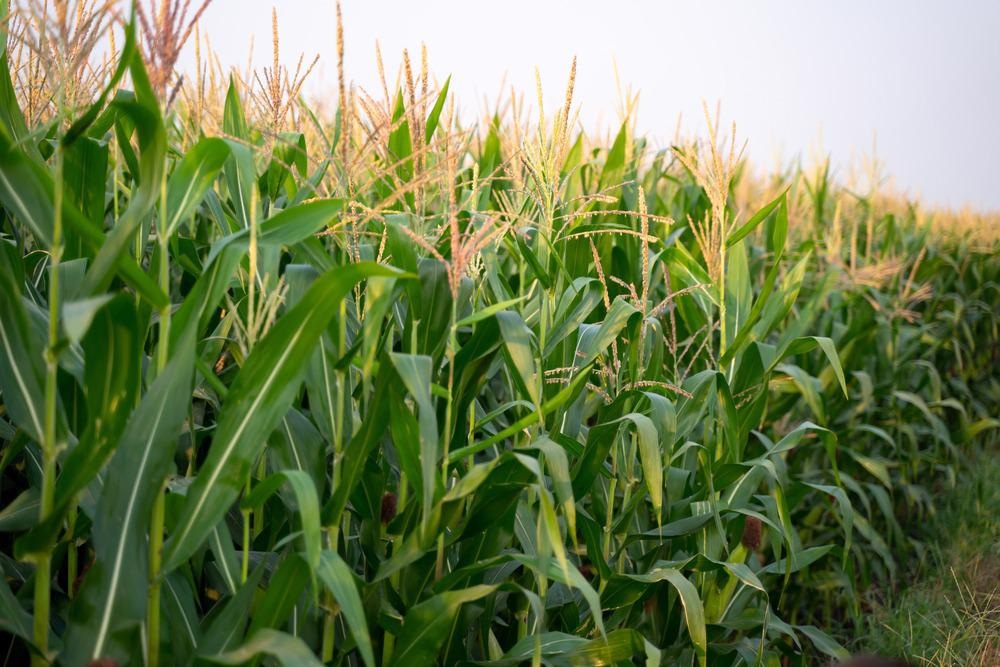Carbon nanoparticles (CNPs) have attracted increased interest in agricultural production in the twenty-first century owing to their excellent bioactivity, high conductivity, eco-friendly manufacturing processes, and large-scale production. A recent publication in the Journal of Cleaner Production focuses on applying CNPs as a foliar spray and soil drench to boost corn production and nutrient absorption.

Study: Carbon nanoparticles improve corn (Zea mays L.) growth and soil quality: Comparison of foliar spray and soil drench application. Image Credit: TEEREXZ/Shutterstock.com
Carbon Nanoparticles (CNPs): The Future of Agricultural Production
Inorganic fertilizers and agro-chemicals, as well as high-yielding crop varieties, significantly improve global agricultural production. However, to fulfill the expanding needs of a fast-growing population, the global food supply must be increased by more than 70%.
Climate change is expected to reduce corn yields significantly by the turn of this century. As a result, developing unique and environmentally friendly agricultural technology is critical to raising crop yield and enhancing crop productivity.
Carbon nanomaterials (CNMs) offer novel answers to various agricultural challenges, including increasing germination of seeds and plant development, improving stress resistance, controlling nutrient intake, detecting plant illnesses, and lowering pesticide input. Carbon nanoparticles (CNPs) are among the most diverse CNMs, with promising effects on agricultural yield.
Limitations of Previous Studies on Carbon Nanoparticles (CNPs)
Despite increased interest in using CNPs in agriculture, studies on plant development and production are varied and often contradictory. Furthermore, a lack of research on appropriate application techniques and how they affect plant development limits improving CNP applications.
Previous research on CNPs has mostly concentrated on comparing agronomical effectiveness to other CNMs, assessing dose-dependent impacts of CNPs, and evaluating diverse plant species and genetic characteristics.
However, the relative benefits of CNPs on plant development and soil conditions under the same testing settings have seldom been examined, limiting the widespread use of CNPs in the agricultural sector.
Application of Carbon Nanoparticles for Corn Growth
The present study aimed to investigate how CNPs administered via distinct modes of administration (foliar spray and soil drench) impact plant development and soil quality. Corn was selected for this research because it is a staple crop worldwide.
Researchers aimed to analyze the efficacy of foliar spray and soil drench methods on plant development metrics and nutrient absorption, as well as the reactions of soil physical and chemical features.
During the experiment, five identical corn seedlings were sowed in each pot, and sprouts were trimmed to two seedlings per week following germination. CNPs were delivered by foliar spray and soil drench at three distinct treatment rates to find the best application technique.
Important Findings of the Study
In this research, CNPs' function in encouraging plant development was investigated by foliar spray and soil drench method, and it was found that the benefits of CNPs vary depending on dosage and delivery technique.
Both foliar spray and soil drench of CNPs substantially boosted plant development and nutrient absorption compared to the control (fertilizer only), indicating that CNPs may be a better alternative than fertilizer.
Selecting proper CNP application techniques is crucial to increasing plant development while minimizing needless expenses and maximizing positive benefits.
CNP foliar spray at 400 mg L-1 and soil drench at 200 mg kg-1 were both effective in improving crop production and soil integrity. The findings indicated that CNPs impacted plant development metrics independent of application mode; however, soil quality characteristics were mostly affected by the soil drench method.
Prospects and Avenues for Further Research
The findings of this study should aid in the relative knowledge of CNPs in encouraging plant development and soil integrity, as well as clarifying the best application method for agricultural usage.
It was found, however, that various parameters such as plant features, CNP properties, soil quality, and experimental circumstances also influence CNP effectiveness in addition to the CNP administration rates and methods.
As a result, subsequent studies should explore a more thorough examination of CNPs in increasing plant development and nutrient absorption under varied soil settings. Furthermore, mechanistic research of surface properties and CNP integration with crops and soils are crucial for their future advancement and uses in the agricultural sector.
Reference
Xin, X. et al. (2022). Carbon nanoparticles improve corn (Zea mays L.) growth and soil quality: Comparison of foliar spray and soil drench application. Journal of Cleaner Production. Available at: https://www.sciencedirect.com/science/article/pii/S0959652622022296?via%3Dihub
Disclaimer: The views expressed here are those of the author expressed in their private capacity and do not necessarily represent the views of AZoM.com Limited T/A AZoNetwork the owner and operator of this website. This disclaimer forms part of the Terms and conditions of use of this website.